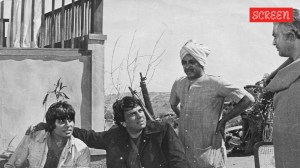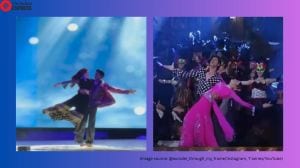Click here to follow Screen Digital on YouTube and stay updated with the latest from the world of cinema.
Anu Malik can take other people’s songs, he just needs to do it like Elvis Presley
Plagiarism is bad, covers are looked down upon, but somehow everyone seems to forget that the great and majestic Elvis Presley became the King of Rock and Roll by singing other people's songs.
 Elvis Presley performing Marguerita, which was later copied by Shankar-Jaikishan.
Elvis Presley performing Marguerita, which was later copied by Shankar-Jaikishan.Music as an art form has been appreciated, imitated, copied, sampled, and remembered since time immemorial. The moment a new sound emerges from the depths of the mind of a troubled artiste, a line of imitators presents itself. When BB King and his guitar Lucille talked, people had no choice but to get inspired, or when Bappi Lahiri uses the saxophone to completely change the scope and tempo of an album as iconic as Sharabi, other producers are bound to take notice. Getting inspired by a piece of music isn’t the problem; it’s the lack of acknowledgement that paints a worrisome picture. If you perform a cover of a song, then you have to let the people know that this in fact is not your creation, that you are merely a vessel.
There are a million cover artistes in the world who keep releasing their takes on iconic songs (here’s looking at you, Ali Sethi), but at least Sethi does it because he is moved by the original composition, not because he can’t come up with something of his own. There are artistes who are incredible performers, but originality is not their strong suit. Some of them get caught, and then there are those who hit the echelons of fame and popularity. They become icons, the superimposed image of an entire genre, and the ‘King of Rock and Roll’ Elvis Presley’s career needs to be studied to understand this phenomenon.
This isn’t speaking ill of the dead. Elvis, for all his faults and questionable characteristics, was an incredibly talented performer. He had what Simon Cowell would describe as the ‘X factor’, although Presley didn’t need a Cowell; he had the manipulative and ice-cold Colonel to fill that spot. This piece is to remind people that no matter how great the lanky and handsome boy from Mississippi was, he wasn’t original. Presley took the radio stations of the southeastern region of the US by storm when he recorded tracks like ‘Baby Come Play House’ by Arthur Gunter and Arthur Crudup’s ‘That’s All Right’. These were some of his early hits, and the former was the song that you see Austin Butler playing in the film Elvis, and we’ll come to that later as well. Elvis’ form of acknowledgement was a little too cloak and dagger. He took permission from several artistes, but never an upfront, ‘Sorry to disappoint, but this is not my song; you should listen to the original’. During that time, the culture of collaboration was different, art was still being segregated based on the race of the artiste, and Elvis seemed like a good way to get the blues, gospel and jazz tracks out there. These are all genres rooted deep within Black culture, and they got limited radio play. But when sung with a white man’s voice, all stations were suddenly open for business. Elvis took the music of Beale Street and spread it all over the world, but the only problem is that he did injustice to the artistes and the brand of music that he seemingly represented.
Humans forget; we love, hate, judge and repent, but soon we forget all that we felt those emotions for. In similar fashion we sometimes forget the origins of something, or the past foundation upon which our current reality is built. We forget because we stop discussing things, and I refuse this notion that soon we will forget where all those songs came from. Gospel is a cry for help and a declaration of love at the same time, both to God. Blues as a genre is what got people through the hardships of life, through despondency, through injustice, and through a society which was nothing but cruel and indifferent towards them. Talking about jazz would take too long, but make no mistake, Elvis was the product of these very art forms, and somehow he forgot those who made him. ‘Trouble’ was Elvis’ call to the world that he won’t be controlled by the media or the government; he was his own artiste and his own individual, and it was a loud call indeed. The only problem is that it wasn’t his song; it was originally a blues track written by Jerry Leiber and Mike Stroller. ‘Can’t Help Falling In Love’ was also not written by Elvis, and the original song was written for a female singer. These are still better examples, because no one else had already sung these songs, but songs like ‘Hound Dog’, written by the two aforementioned gentlemen, was originally sung by Big Mama Thornton. ‘Blue Suede Shoes’ was written and recorded by Carl Perkins, and Elvis wasn’t the only one to make money off of that.
The film Elvis (2022) was a long shot by all standards of the game. The writing was broken, the characters unconvincing, and it felt like a soap opera came to life on the big screen. Apart from everything wrong with it, the film had a unique chance of telling the story of the people behind Elvis’ music, but all it did was make it seem like these people inspired Elvis, and he never took any of their songs. You see Thornton singing in a bar where BB King and Elvis are hanging out, but the way the scene is shot, and the nature of the narrative that follows that frame, suggests that our Cadillac-driving, gelled-up singer was just taking in the vibes and not planning to play that exact same song in front of thousands of people next Sunday! Elvis isn’t here, and we don’t have any further proof of how much money trickled down to the people whose songs he sang. Maybe he did thank all these people, or maybe I missed a few performances where he gave a shout-out to Old Boy Crudup, but the film had the chance to change that maybe into definitely and talk about the people who penned and performed some of the most well-known songs of the 20th century.
This piece doesn’t intend to take the whole Eminem approach to this situation and say, “To use Black music so selfishly and use it to get myself wealthy.” (He said this and name-dropped Elvis too.) The intention is to call just Elvis a little forgetful, because he has done a lot of things during his time in this world which could be questioned, but that doesn’t need to happen today. All one wants is for some people to get credits for their songs; for Leiber and Stroller to get more than just a single line on Wikipedia on a page no one is ever going to visit; for Thornton to be remembered for being a trailblazing woman. Art will continue to be imitated till the day art is created, and inspiration will continue to be born in one’s mind upon experiencing someone else’s excellence. We need to understand that some pieces of art should be left alone (including national anthems; you would think that would be a given), and if not, their creators need to be given due credit. Presley introduced the world to sounds and ideas in a way no one else could (I mean, BB could if he were white), and he did it with style. That’s what Anu Malik, Pritam and everyone else in Bollywood need to understand. If you want to revamp another song from an old film or an album or just rip off Korean songs, just do it with some flair, wiggle, and panache, just like Elvis Presley did.
Photos
- 01
- 02
- 03
- 04
- 05

































